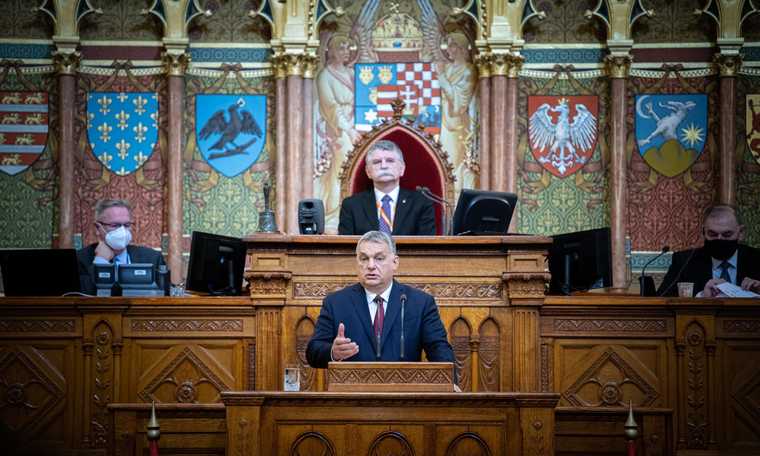By: V4 Agency
In the next few months we will complete the mass inoculation plan, gradually phase out the Covid-19 restrictions based on people’s views and implement our action plan designed to restart the economy, Hungarian PM Viktor Orban said on the first day of the Hungarian parliament’s spring session on Monday.
Viktor Orban said that the last two months have also centred on fighting the coronavirus. He recalled that on 11 November last year, the government introduced restrictive measures on the advice of experts.
The prime minister reminded MPs that the epidemic data shows increasing numbers not only in Hungary, but also throughout Europe. According to experts, the new mutations may lead to a continuing upward trend, therefore it is necessary to extend the govenment’s special mandate granted by parliament, and to continue to comply with the regulations going forward.
In last year’s national consultation, Hungarian people indicated that the country must remain functional while fighting off the coronavirus, which is why workplaces and primary schools remained open. However, the introduction of a curfew, the closure of restaurants, nightclubs and spas was necessary to contain the spread of the virus.
“Our crisis management is consistent, the measures have not changed since November, so we have managed to keep the epidemic under control,” Viktor Orban said, adding that countries in the West who decided to reopen are experiencing a third wave of infections with new impetus.
Speaking about reopening, Mr Orban said they want to restart not just the economy, but community life as well, adding that this requires a vaccine.
“We want to emerge from the epidemic stronger than how we entered,” he declared.
We need to obtain as many vaccines as possible and not just “in time”, as promised by Brussels, but immediately, Hungary’s premier stressed. He noted that each vaccine that is safe and has been used to inoculate millions of people around the world is good. That is why, in addition to the Western vaccines, Hungary also procured Russian and Chinese vaccines.
According to the PM, despite the uncertainties of European vaccine supplies, by the end of May 3.5 million more people could be vaccinated in Hungary than in a Western country with a similar population. He stressed that each day counts, so whoever saves time will be able to save hundreds, or thousands of lives.
Mr Orban also said that the vaccine mustn’t be turned into a political issue. Life-saving vaccine procurement is not the area to demonstrate our commitment to the US and Brussels; this cannot be considered a political matter, he added.
The prime minister said it only makes sense to introduce restrictions that most people accept and can thus be enforced. The country entered a new phase with the start of the vaccination programme, MR Orban said, adding that a new national consultation is on its way to probe public opinion with regards to 7 questions on reopening.
As to the economy, Viktor Orban said that it grew at a high pace before the pandemic, with a low deficit and declining state debt. The pandemic hit the Hungarian economy pretty hard in 2020, but it did not collapse.
Hungary’s crisis management focused on job protection. The government introduced a general moratorium on loan rapayments, leaving 3.300 billion forints (some 10 million euros) in people’s pockets. The state-sponsored investment protection action plan affected 1434 businesses, Mr Orban said, adding that the government had initiated vaious guarantee programmes and spent much on making the so-called Szechenyi Card Programme accessible. Over half the resources pumped into the economy have landed with small and medium-sized businesses (SMEs), he said.
The prime minister said the govenment’s crisis management was successful, because the number of employed in December 2020 were the same as before the pandemic.
Mr Orban stressed that as soon as there is enough vaccine, the government would embark on a gradual and responsibe easing of restrictions. A slew of economic development measures will also be introduced, collectively dubbed the Economic Recovery Action Plan. Hungary’s economy must be restarted through with job creation, tax cuts and investment support.
PM Orban said the recovery action plan consists of 7 steps:
- VAT on housing constructions reduced to 5 percent,
- wage subsidies for enterprises,
- gradual reintroduction of the 13th month pension,
- significant increase of salaries in the medical sector,
- income tax relief for people aged under 25,
- 10-million-forint (€28,000) interest-free loans to companies,
- housing renovation support.
The Hungarian premier said that one of the biggest winners of the relaunch will be the higher education sector, adding that universities will receive around 1500-2000 billion forints in investments. Mr Orban also underlined that the gradual reintroduction of the 13th month pension began last Friday.
He described the government’s income tax relief for those under 25 as an unprecedented move, stressing that young people who work will also be able to enjox a tax exempt status and various family subsidies.
The government will be working on three major issues in the coming months: rolling out the mass vaccination programme, phasing out restrictions after a public survey on the issue and implementing the economic recovery plan.
“Hungary will be stronger after the epidemic than it was before,” Viktor Orban said.

